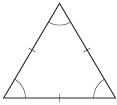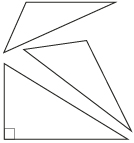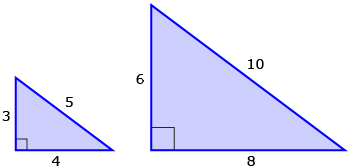Lesson 1
1. Lesson 1
1.5. Explore
Module 5: Geometry
Explore
As you are aware, a triangle is a polygon made up of three sides. It is a very popular shape that is used in many structures for both aesthetics and its incredible strength.
The triangle is the strongest of all polygons since the length of each side is dependent on the other two sides, and the measurement of each angle within the triangle is dependent on the other two angle measurements. As you learned in the Try This 1 activity, you cannot change one measurement—be it the length of the side or angle measurement—without affecting the other measurements. The angles and sides act as reinforcements for one another, making the triangle very rigid and strong, hence the reason it is so popular in construction!
Triangles can be classified in two different ways—by angle measure and by side length.
| Triangles Classified By Angle Measure | ||
| acute | all three angle measures are less than 90° |  |
| obtuse | one angle measure is greater than 90° | |
| right | one angle measure is 90° |  |
Source: MathWorks 12 Student Book/Teacher Guide. (Vancouver: Pacific Educational Press, 2011.)
| Triangles Classified By Side Length | ||
| equilateral | three sides are of equal length and three angles are of equal measure |  |
| isosceles | two sides are of equal length and two angles are of equal measure |  |
| scalene | no sides are of equal length and no angles are of equal measure |  |
Source: MathWorks 12 Student Book/Teacher Guide. (Vancouver: Pacific Educational Press, 2011.)

The 3:4:5 triangle is a right-angled triangle where the sides have a ratio of 3:4:5. The image shows some examples of 3:4:5 triangles, also known as Pythagorean triples.
The 3:4:5 triangle has been used for centuries, and it is claimed to be the special triangle used to construct the Great Pyramids of Giza.

iStockphoto/Thinkstock
It appears the Egyptians were familiar with some mathematics that are still used today by carpenters and other tradespeople to square corners when a measuring device is not available. For example, a carpet installer may use the 3:4:5 triangle rule to ensure that the corners of a carpet that have been cut are indeed 90 degrees.